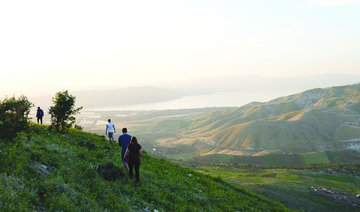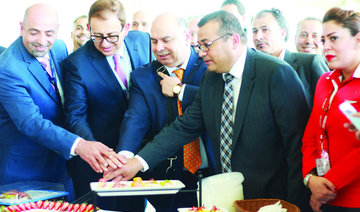LONDON: Ryanair’s plan to launch new routes to Jordan is a “historic” move that could boost the kingdom’s tourism to pre-Arab Spring levels.
Industry providers welcomed Sunday’s announcement that the low-cost carrier will roll out 14 new routes to Jordan in 2018, bringing around 500,000 customers to the country a year and opening up new source markets from Europe.
“We put a lot of time and energy into bringing Ryanair to Jordan; this has been 10 years in the making,” said Mahmoud Freihat, area marketing manager at the Jordan Tourism Board (JTB), which is responsible for marketing the country abroad.
“It’s a big investment from Ryanair. It shows their trust in Jordan,” he added.
By the end of 2018, Amman will be connected to 10 new cities, including Milan, Budapest, Bologna, Krakow, Bucharest, Paphos, Prague, Brussels, Vilnius, and Warsaw; with a further four flights to Aqaba from Athens, Rome, Cologne and Sofia.
British taxes priced out a Ryanair flight to the UK but the government is looking at other low-cost carriers in the region to fill the gap, Freihat said.
The routes tap into the lucrative low-cost carrier market, opening the country up to a new sector of travelers.
“Low-cost airlines in Europe have changed the way people travel; people look at where they fly and go there,” said Suleiman Farajat, deputy chief commissioner for the Petra Development and Tourism Regional Authority.
Commentators pointed to a huge gap in the market in Jordan, where low-cost carrier penetration is approximately 10 percent, compared to Morocco, another MENA country on the Mediterranean, where it’s around 40 percent.
In the past, easyJet operated flights between Europe and Jordan but pulled out in 2014. Back then, Farajat said, few international tourists were coming to the region, but now, “Demand is high and it’s the right time.”
Tourism in Jordan is on the mend following a significant setback in the years after the Arab Spring. Figures released by the Central Bank of Jordan showed a 12.5 percent increase in 2017 tourism receipts.
Visitors numbers dwindled between 2011 and 2015, despite Jordan remaining stable throughout the conflict in neighbouring Syria.
However, an attack by armed gunmen on a tourism site in the city of Karak in Dec. 2016 killed 10 people, including a Canadian tourist, and left dozens injured.
“Improvement in air connectivity definitely has a positive impact on destinations’ tourism industry, as it increases tourist arrivals, spending and job creation,” World Travel and Tourism Council (WTTC) Research Director, Rochelle Turner told Arab News,
“Jordan has a wealth of amazing cultural and natural treasures for visitors to admire. The launch of new air routes to Jordan is good news for the country’s economy.”
According to the WTTC, travel and tourism’s total contribution to GDP was nearly 20 percent in 2016 and is forecast to rise to almost 23 percent by 2027.
“In the last two years tourism has really started to pick up - 2017 was a really good year,” Farajat, said, adding that the challenge now is to enhance tourism infrastructure to meet rising demand.
The new routes to Amman and Aqaba will bring a “tremendous increase” in visitors to Petra, he added, explaining that Jordan’s most famous attraction acts as a “barometer” for the sector.
About 620,000 tourists visited Petra in 2017, a 34 percent increase on the previous year. This year, Farajat hopes the numbers will climb to 800,000. “The benchmark is 2010 when we had one million,” he said.
Muna Haddad, managing director at Baraka, a sustainable tourism company in Jordan, is anticipating a “broader base” of visitors. “This is definitely going to expand the range of groups interested in visiting Jordan.
“Other low-cost carriers have been in Jordan before and closed down … having a government serious about creating a hospitable environment for them is really historic.”
Industry insiders have credited Jordan’s tourism minister Lina Mazhar Annab with breaking through the impasse to finalise the deal, with incentives for Ryanair, such as exemption from certain taxes and reduced landing fees.
In a statement announcing the launch, Annab said: “Ryanair’s decision to fly to Jordan sends a loud and clear message about the diversity and the untapped potential of Jordan’s tourism product. It also shows confidence in the tourism industry in Jordan, which has witnessed double-digit growth in the past year.”
Freihat said more routes will likely be added in the years ahead. “We really believe this puts Jordan in the middle of Europe,” he added anticipating that the new flights to Aqaba, a sleepy airport in south, will open up new options for visitors to Jordan’s major sites.
With Petra just an hour and a half away, Wadi Rum 45 minutes and the Dead Sea an hour and a half, he anticipates Europeans coming on long weekends to see the sites, bringing more business to single destinations and benefitting communities reliant on tourism across the country.
“We are now able to make the Kingdom more accessible to a broader segment of potential tourists … whose impact on the local economy will be substantial on every level of the tourism sector supply-chain,” Managing Director of the Jordan Tourism Board Abed Al-Razzaq Arabiyat said in a statement.
Budget flights to Europe will breathe new life into Jordan tourism
Budget flights to Europe will breathe new life into Jordan tourism

Israel’s Shin Bet chief announces resignation, to step down June 15, Israeli media reports

The Shin Bet, which handles counter-terrorism investigations, has been at the center of a growing political battle pitting Netanyahu’s right-wing coalition government against an array of critics ranging from members of the security establishment to families of hostages in Gaza.
Netanyahu said on March 16 that he had long ago lost confidence in Bar and that trust in the head of the domestic security service, whose roles include counter-terrorism and security for government officials, was especially crucial at a time of war.
The Supreme Court later temporarily froze the government’s bid to sack Bar, who claimed that Netanyahu wanted to fire him after he refused to fulfill requests that included spying on Israeli protesters and disrupting the leader’s corruption trial.
Netanyahu, in response to the accusations, accused Bar of lying.
Israel army says hit more than 50 ‘terror targets’ in Lebanon in past month

- On Sunday, Israel struck south Beirut for the third time since the fragile November 27 ceasefire went into effect
- Israeli Prime Minister Benjamin Netanyahu vowed to stop Hezbollah from using Beirut’s southern suburbs as a 'safe haven'
JERUSALEM: Israel’s military said Monday that it had struck more than 50 “terror targets” across Lebanon over the past month, despite a November ceasefire that ended a war between it and Hezbollah militants.
On Sunday, Israel struck south Beirut for the third time since the fragile November 27 ceasefire went into effect, prompting Lebanese President Joseph Aoun to call on its guarantors France and the United States to force a halt.
“Over the past month, the IDF (military) has struck more than 50 terror targets across Lebanon. These strikes were carried out following violations of the ceasefire and understandings between Israel and Lebanon, which posed a threat to the State of Israel and its citizens,” the military said in a statement.
Israeli Prime Minister Benjamin Netanyahu’s office said Sunday’s strike targeted a building used by Hezbollah to store “precision-guided missiles,” and vowed to stop the Iran-backed militant group from using Beirut’s southern suburbs as a “safe haven.”
Hezbollah leader Naim Qassem said in a speech Monday that the attack “lacks any justification,” going on to call it “a political attack aimed at changing the rules by force.”
Israel has continued to carry out regular strikes in Lebanon despite the truce, which sought to halt more than a year of hostilities with Hezbollah that culminated in a heavy Israeli bombing campaign and ground incursion.
Under the deal, Hezbollah was to pull its fighters north of Lebanon’s Litani River, some 30 kilometers (20 miles) from the Israeli border, and dismantle any remaining military infrastructure to its south.
Israel was to withdraw all its forces from south Lebanon, but troops remain in five positions that it deems “strategic.”
Gaza rescuers say Israeli strikes kill at least 40

- Eight people were killed in an Israeli strike on the Abu Mahadi family home in Jabalia
- An Israeli strike on the Al-Agha family home killed five people in an area of Khan Yunis in the south
GAZA CITY, Palestinian Territories: Gaza’s civil defense agency said Israeli strikes on Monday killed at least 40 people across the Palestinian territory, which has been under an Israeli aid blockade for more than 50 days.
Israel resumed its military campaign in the Gaza Strip on March 18. A ceasefire agreement that had largely halted the fighting for two months before that collapsed over disagreements between Israel and the Palestinian militant group Hamas, whose 2023 attack triggered the war.
Civil defense official Mohammed Al-Mughayyir told AFP that 40 people had been killed since dawn on Monday.
They included eight people who were killed in an Israeli strike on the Abu Mahadi family home in Jabalia, in the north of the territory.
“They were sleeping in their homes, feeling safe, when missiles hit... this scene makes the body shiver,” said Abdul Majeed Abu Mahadi, 67, who added that his brother was killed in the attack.
“If a person looked at this scene, they would have seen children, women and elderly men cut into pieces, it makes the heart ache, but what can we do?“
The civil defense agency reported that another 10 people were killed in an Israeli strike on the Al-Ghamari family home in the Al-Sudaniya area northwest of Gaza City.
A strike on the Al-Agha family home killed eight others in an area of Khan Yunis in the south, it added.
Fourteen others were killed in four separate strikes across the territory, the civil defense said, including one that hit a tent sheltering displaced people in the Al-Shafii camp, west of Khan Yunis.
There was no immediate comment from the Israeli military.
The health ministry in Hamas-run Gaza said on Monday that at least 2,222 people have been killed since Israel resumed strikes, bringing the overall death toll since the war broke out to 52,314.
The Hamas attack on Israel on October 7, 2023 resulted in the deaths of 1,218 people on the Israeli side, mostly civilians, according to an AFP tally based on official figures.
Militants also abducted 251 people, 58 of whom are still being held in Gaza, including 34 the Israeli military says are dead.
Israel says its renewed military campaign aims to force Hamas to free the remaining captives.
Iran minister blames ‘negligence’ for port blast that killed 65

- Iran’s state TV showed images of firefighters still dousing the flames Monday, and said the damage would be assessed after the fire was fully brought under control
TEHRAN: Iran’s interior minister on Monday blamed “negligence” for a massive explosion that killed 65 people at the country’s largest commercial port, with firefighters still battling a blaze at the facility two days later.
The blast occurred on Saturday at the Shahid Rajaee Port in Iran’s south, near the strategic Strait of Hormuz, a waterway through which one-fifth of global oil output passes.
“The death toll has reached 65 in this horrific incident,” Mohammad Ashouri, governor of the southern Hormozgan province where the port is located, told state television, adding that the fire has not been fully extinguished yet.
Officials have said more than 1,000 people were injured. The province’s crisis management director, Mehrdad Hassanzadeh, said most had already been released after treatment.
On Monday, Interior Minister Eskandar Momeni told state TV that “culprits have been identified and summoned,” and that the blast was caused by “shortcomings, including noncompliance with safety precautions and negligence.”
Momeni, who has been in the area since hours after the blast, stated that the “investigation is still underway.”
Iran’s state TV showed images of firefighters still dousing the flames Monday, and said the damage would be assessed after the fire was fully brought under control.
Heavy charcoal-black smoke continued to billow over low flames at part of the site, above which a firefighting helicopter flew, pictures from the Iranian Red Crescent showed.
Iran’s supreme leader Ayatollah Ali Khamenei has ordered a probe into the incident.
It was not immediately clear what caused the explosion but the port’s customs office said it likely resulted from a fire that broke out at the hazardous and chemical materials storage depot.
CCTV images on social media showed it began gradually, with a small fire belching orange-brown smoke among a few containers stacked outside, across from a warehouse.
A small forklift truck drives past the area and men can be seen walking nearby.
About one minute after the small fire and smoke become visible, a fireball erupts as vehicles pass nearby, with men running for their lives.
President Masoud Pezeshkian visited hospitals treating the wounded on Sunday in the nearby city of Bandar Abbas.
Since the explosion, authorities have ordered all schools and offices in the area closed, and have urged residents to avoid going outside “until further notice” and to use protective masks.
The New York Times quoted a person with ties to Iran’s Islamic Revolutionary Guard Corps, speaking on condition of anonymity to discuss security matters, as saying that what exploded was sodium perchlorate — a major ingredient in solid fuel for missiles.
Defense ministry spokesman Reza Talaei-Nik later told state TV that “there has been no imported or exported cargo for military fuel or military use in the area.”
Iran’s ally Russia has dispatched specialists to help battle the blazes.
Authorities have declared Monday a national day of mourning, while three days of mourning began Sunday in Hormozgan province.
The blast occurred as Iranian and US delegations were meeting in Oman for high-level talks on Tehran’s nuclear program.
While Iranian authorities so far appear to be treating the blast as an accident, it also comes against the backdrop of years of shadow war with regional foe Israel.
According to The Washington Post, Israel launched a cyberattack targeting the Shahid Rajaee Port in 2020.
Israeli authorities order Palestinians to stop building homes in Al-Jib town

- Residents were ordered to halt construction on three homes and caravans for livestock
- The stop-work order is a decree that often triggers a demolition order
LONDON: Israeli authorities issued stop-work orders for several Palestinian structures being built in Al-Jib town, north of occupied East Jerusalem.
On Monday, authorities stormed Al-Jib and notified residents to halt construction on three homes and caravans for raising livestock, according to the Wafa news agency. The stop-work order is a decree that often triggers a demolition order.
The majority of village territory, located 9 km north of Jerusalem, falls within Area C where the Palestinian Authority is in charge of educational and health services, while Israel remains responsible for security and construction.
Israel restricts Palestinians from expanding in Area C, and inside Jerusalem, it rarely grants building permits to residents of the city. Al-Jib is surrounded by several Israeli settlements, the biggest of which is Giv’at Ze’ev.
The Palestinain Authority-affiliated Wall and Settlement Resistance Commission reported in March that Israeli authorities carried out 58 demolition operations in the occupied West Bank, affecting 87 structures. These included 39 inhabited homes, six uninhabited houses, and 26 agricultural properties in the cities of Nablus, Tulkarm, Jerusalem, and Salfit.


















